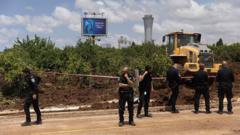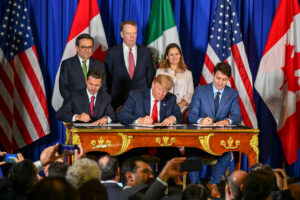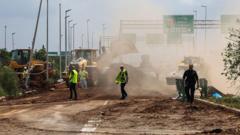With anticipation rising for the scheduled nuclear talks between the US and Iran in Oman, President Trump expressed optimism for a potential agreement that could significantly alter diplomatic relations and economic sanctions impacting Iran.
Progress Updates on US-Iran Nuclear Discussions: Hope for an Accord

Progress Updates on US-Iran Nuclear Discussions: Hope for an Accord
Key negotiations set to occur in Oman could reshape Iran's economic future and regional security dynamics.
In recent developments, a new round of negotiations between the United States and Iran regarding Tehran’s nuclear program is scheduled for Saturday in Oman. The discussions come with heightened expectations for a diplomatic resolution that could help avoid further conflicts in the Middle East.
In an interview published by Time magazine, President Trump expressed a renewed sense of hope regarding the potential for a deal with Iran, stating, "I think we’re going to make a deal with Iran. Nobody else could do that." This is a notable shift, considering Trump's previous withdrawal from the Joint Comprehensive Plan of Action (JCPOA) in 2018, which he condemned as fundamentally flawed.
The importance of these talks extends beyond mere diplomacy, as a successful agreement could substantially alter the security landscape of the region. It holds the promise of decreasing the probability of U.S.-backed Israeli actions against Iranian nuclear sites and could also stymie Iran’s advancement toward nuclear weapon capabilities. Moreover, a favorable deal may pave the way for the alleviation of economic sanctions on Iran, consequently revitalizing its economy by attracting foreign investments.
Key figures involved in this round of talks include Steve Witkoff, the Middle East envoy for the Trump administration, and Abbas Araghchi, Iran’s Foreign Minister, along with technical experts from both nations. Meetings will take place in the Gulf nation of Oman, which is serving as a mediator.
These discussions will focus on crucial technical issues, including the protocols for monitoring Iran’s nuclear facilities, defining limits on uranium enrichment, and addressing management of highly enriched uranium stockpiles—all intertwined with sanctions relief propositions.
As the discussions advance, they may more clearly define the future relationship between Iran and the West, a factor that is critical not just to the countries involved but also for international security as a whole. With much at stake, all eyes are on Saturday’s negotiations to see if diplomatic solutions will triumph over potential escalations.
In an interview published by Time magazine, President Trump expressed a renewed sense of hope regarding the potential for a deal with Iran, stating, "I think we’re going to make a deal with Iran. Nobody else could do that." This is a notable shift, considering Trump's previous withdrawal from the Joint Comprehensive Plan of Action (JCPOA) in 2018, which he condemned as fundamentally flawed.
The importance of these talks extends beyond mere diplomacy, as a successful agreement could substantially alter the security landscape of the region. It holds the promise of decreasing the probability of U.S.-backed Israeli actions against Iranian nuclear sites and could also stymie Iran’s advancement toward nuclear weapon capabilities. Moreover, a favorable deal may pave the way for the alleviation of economic sanctions on Iran, consequently revitalizing its economy by attracting foreign investments.
Key figures involved in this round of talks include Steve Witkoff, the Middle East envoy for the Trump administration, and Abbas Araghchi, Iran’s Foreign Minister, along with technical experts from both nations. Meetings will take place in the Gulf nation of Oman, which is serving as a mediator.
These discussions will focus on crucial technical issues, including the protocols for monitoring Iran’s nuclear facilities, defining limits on uranium enrichment, and addressing management of highly enriched uranium stockpiles—all intertwined with sanctions relief propositions.
As the discussions advance, they may more clearly define the future relationship between Iran and the West, a factor that is critical not just to the countries involved but also for international security as a whole. With much at stake, all eyes are on Saturday’s negotiations to see if diplomatic solutions will triumph over potential escalations.






















